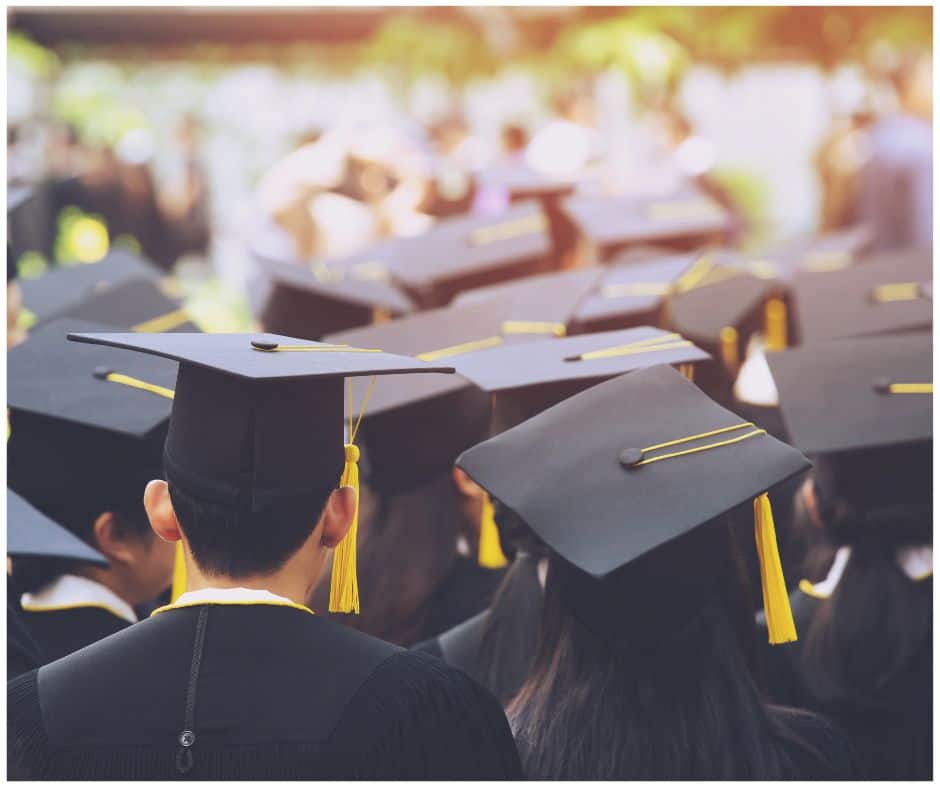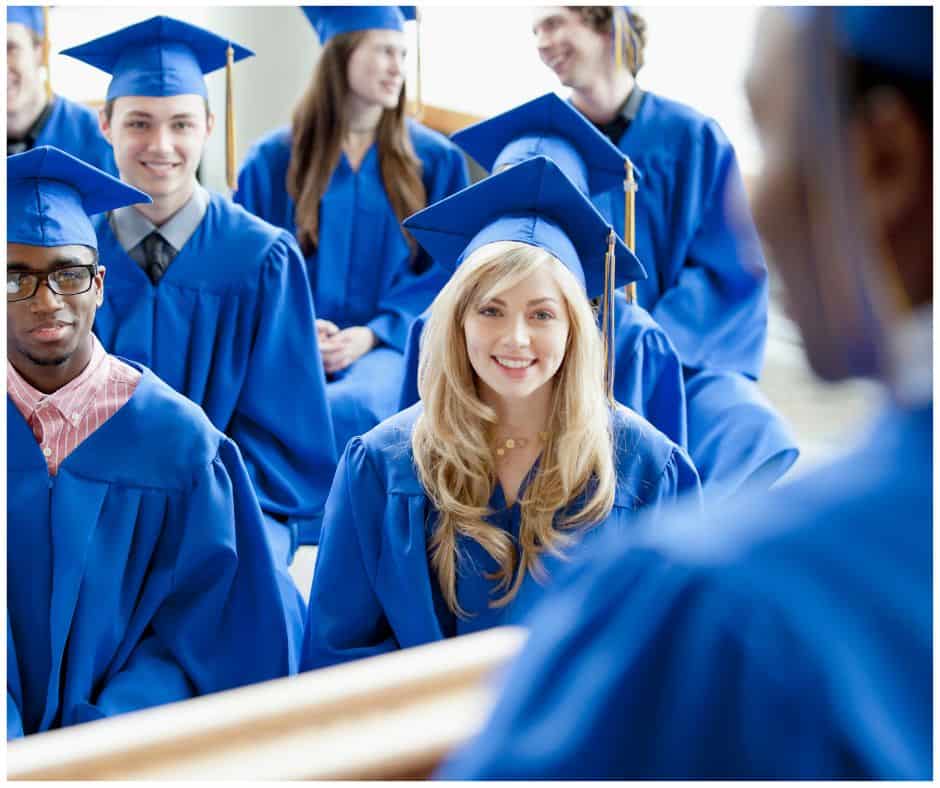Updated on June 12th, 2024
In the name of “fairness,” some schools are ditching the traditional class rankings system, eliminating the titles of valedictorian and salutatorian from their lexicon. Starting next year, Noblesville High School in Noblesville, Indiana will join the ranks of schools forgoing these titles. The hope is it will help students focus on bettering themselves and not just beating their classmates, shifting the emphasis to overall academic performance.
Contents
- 1 Those with High-Class Rankings Aren’t Guaranteed to Change the World
- 2 Most Millionaires Weren’t Their Class Valedictorian or Salutatorian
- 3 The Imbalance of Class Rankings
- 4 Class Rankings Do Still Play a Role in Some Admission and Scholarship Decisions
- 5 The Stress of Trying to be Valedictorian in High School
So, with more high schools either making or looking into changes regarding class rankings, the real question is this: does it matter if you’re valedictorian?
There are potent arguments on both sides of the equation, making it hard to determine which approach is actually best for students. To help shine a light on this growing debate, here is what you need to know.
If you and your student want to learn more about finding scholarships, ! Take a moment and head over to http://thescholarshipsystem.com/freewebinar to reserve your spot today.
Those with High-Class Rankings Aren’t Guaranteed to Change the World
Now, this isn’t saying that those who graduate at the top of their classes and achieve a high class rank aren’t successful. In fact, a researcher at Boston College who followed the progress of those with the highest class rankings, 81 valedictorians and salutatorians, found that most are successful.
Of that group, 95 percent graduated from college and had an average GPA of 3.6, and a total of 60 percent ultimately obtained a master’s degree. Almost 90 percent of the students held professional careers, and 40 percent reached the upper echelon in their field. Overall, these people were considered generally successful and led good lives.
However, none of them reached what the researcher referred to as the “very top of adult achievement arenas.”
So, if those with the highest class rankings represent the best and brightest, why aren’t they making a bigger impact on the world?
The researcher, Karen Arnold, believed this is because of two reasons. First, doing well in school and reaching the top of the class rankings system is based on following instructions or “doing what you are told.” While this demonstrates self-discipline, it isn’t necessarily a marker of intelligence. Second, being named valedictorian or salutatorian doesn’t account for a student’s level of passion or expertise.
As Arnold put it, “Essentially, we are rewarding conformity and the willingness to go along with the system,” and that isn’t necessarily a recipe for greatness.
Most Millionaires Weren’t Their Class Valedictorian or Salutatorian
To reach millionaire status, most people have to do something innovative or groundbreaking. This means shaking things up, and isn’t necessarily an approach a rule-following careerist, as most valedictorians, salutatorians, and others with a top-class rankings are likely to become, is going to take.
In a study involving 700 millionaires, it showed an average GPA of just 2.9. However, these men and women represented out-of-the-box thinkers who weren’t afraid to look at the status quo and choose another path.
Eric Barker, the author of the book “Barking Up the Wrong Tree,” spoke regarding the research, explaining the disconnect this way:
“In school, rules are very clear. In life, rules are not so clear. So a certain amount of not playing by the rules is advantageous once you get out of a closed system like education.”
Barker, during an interview with Business Insider, also said, “Valedictorians often go on to be the people who support the system – they become a part of the system – but they don’t change the system or overthrow the system.”
The Imbalance of Class Rankings
Being awarded a title like valedictorian doesn’t necessarily mean the same thing from one school to the next. As covered by The College Board (purveyors of the SAT and AP exams), class sizes greatly affect how meaningful titles and class rankings are. Class rankings are often based on weighted GPA, which takes into account the difficulty of courses.
For example, being valedictorian of a class of 500 is different than if the graduating class only has 40 students. Additionally, it carries a different weight when graduating from a smaller elite private school than a larger public school.
Similarly, being within the top 10 percent of the class rankings is harder to achieve when there is a smaller student body. This means even students with highly competitive GPAs can be squeezed out of this key demographic, making it harder to get into certain universities even if they clearly outperformed members of the top 10 percent from a larger graduating class.
Some schools have even skewed things further. For example, the 2013 graduating class from South Medford High in Oregon had 21 valedictorians while Enterprise High in Alabama had 34 (and they only had a graduating class of 84 students)! This means all of those students could claim to hold the number 1 spot when they applied to college.
These inconsistencies have led some schools to stop ranking their students, and certain colleges decided to rely on SAT or ACT scores and GPAs instead of giving class rankings much consideration.
Class Rankings Do Still Play a Role in Some Admission and Scholarship Decisions
It is important to note that class ranks are still being used by some colleges and universities, as well as individual scholarships. However, class rank is just one factor in the holistic college application process, where GPA, standardized test scores, and recommendation letters are also considered. A good class rank can improve college admission chances, but it is not the only determinant. Only about half of high schools still use class rank, reflecting a trend away from this traditional model.
Class Rankings and Their Impact on College Admissions
For most college admissions where it is still a consideration, class rankings are only part of the equation. This means that students that graduate 4th or 6th likely have a similar shot of gaining admission when compared to valedictorians or salutatorians if their GPAs are at a comparable level and have similar extracurricular activities, SAT or ACT scores, and a suitably difficult high school curriculum under their belts.
Related article: How to Boost SAT & ACT Test Scores
This approach means that students who aren’t selected as the valedictorian or salutatorian have an excellent chance of getting accepted if their performance meets the mark. In fact, they may even beat out certain valedictorians or salutatorians from schools with lower average performance. Remember, not all students with top-class rankings hold high GPAs; they are just the higher achieving students in their graduating class.
Does Being at the Top Help with Scholarship Applications?
Unlike most college admissions standards, a scholarship may have a cutoff, requiring specific class rankings or that your student falls within a certain percentage in their graduating class. More often than not, these are merit-based scholarships given through the state that you live in or the university. The nice thing about these scholarships is that students can often automatically qualify for them, receiving the money as long as they meet the requirements (such as class rank, ACT/SAT score, and more.)
TIP: If your child has an idea of where they want to go to school, I highly recommend researching their merit-based scholarship criteria. Based on what you find, you can then set goals for the school year regarding GPA, class rank, standardized test scores, and more. Still, as we mentioned, you will most likely find that the requirements are top 5% or 10% (not necessarily Valedictorian or Salutatorian.)
Still, some students can automatically receive scholarships from specific colleges and universities for being Valedictorian or Salutatorian. In this case, being first or second can help. After that, however, the next level is typically for the top percentage (meaning 4th place is the same as 6th place, etc. as long as they meet the percentage requirement.)
Ultimately, I highly recommend looking at the schools your child is considering before pushing them to stress over rankings.
What if my child doesn’t reach these targets?
While not reaching the mark does mean your child won’t qualify for that specific merit-based scholarship, it’s important to remember there are so many out there that don’t take class rankings into consideration and instead focus on overall academic performance. So, if your student misses the top 10 percent cutoff or some other academic criteria, don’t fret! There are plenty of opportunities to which they can apply.
If you want to learn more about how your child can find great scholarships regardless of class rankings, attend our free college scholarship webinar for parents where I cover exactly where to find legitimate, less-competitive scholarships.
The Stress of Trying to be Valedictorian in High School
Likely, your high schooler already feels as though there is a mountain of pressure on their shoulders, especially if they are college-minded. School counselors can help students manage the stress of trying to achieve high class ranks. Academics, extracurricular activities, volunteer positions, paid employment, and even household obligations all add up. Then, if you add pressure to outperform their classmates in order to reach that valedictorian title or other top-class rankings, it can easily become too much to bear.
A recent study of students at a high-performing school showed that nearly half of all students experienced “a great deal of stress on a daily basis,” reporting grades, homework, and college preparations as major causes. Of those surveyed, 26 percent also self-reported symptoms of depression, a worrisome number to say the least.
While encouraging your child to do their best is always a wise parenting move, adding the pressure of trying to be valedictorian or salutatorian may be unnecessary. Many colleges don’t factor in class rankings when admitting students (or they at least value other factors more) and there are plenty of scholarships for talented students even if they don’t qualify for some based on their class rankings.
Ultimately, encouraging them to find something they are passionate about could provide more long-term value than getting the highest class rankings title of valedictorian as it gives them a reason to keep learning and growing as they enter adulthood.
Related articles:
- 5 Areas to Focus on for Improved College Admission Success
- Free College Tuition is Actually Possible at These Schools
- Why a Full Ride Scholarship Requires Much More than Free College Tuition
What do you think? This article was written to show a different side to the rankings argument. Do you agree? Disagree? Share your thoughts.
If you and your student want to learn more about finding scholarships, sign up for our free college scholarship webinar! Take a moment and head over to http://thescholarshipsystem.com/freewebinar









We have this problem of unequal ranking in our high school. Advanced performing arts classes can only be awarded honors weight once during the life of the student in high school. This is totally unfair and encourages students not to excel in their chosen fields if they want to receive high ranking.
Oh wow. So if they take all the classes in honors, only one of them will receive the weighted boost? Yes, that doesn’t sound fair. Interesting!
This seems like a pretty complex issue to answer with one fell sweep. I had a number of thoughts on the issue.
1. “The hope is it will help students focus on bettering themselves and not just beating their classmates.” I think that is a noble thought, but in reality competition is a major drive for excellence. I made this comment to three of the groups of athletes at my school. They all, literally all, said that the team work was crucial to their win, but their personal excellence and recognition for it was their “fuel.” Couldn’t the same be said of the student whose gifting is academically inclined? musically?
2. The statement that most top scholarly performers were also successful in life. That seems to make a point in favor.
3. I think that the statement that awarding valedictorians is an equivalent to awarding conformity is particularly confusing. Prior to teaching, I worked in government service as a wildlife biologist. I was always recognized for my excellent work in my field. At the tender ages of 15-18, aren’t our student (emphasize students) being given the same recognition. We give arts awards, sports awards, and academic awards.
4. I don’t really know how we as educators can predict the student’s future passions and expertise. Those are often developed over a lifetime of living. The excellence I have achieved in my profession, has been from working in my profession. Of course, it doesn’t necessarily correlate the whether I was a 3.8 GPA or a 4.2. For some, the “passion” isn’t even a part of how the individual earns his money.
6. Another section of the essay seemed to correlate success with specific business success and earnings. For us, educators, (and for wildlife biologists, for that matter) neither are markers of success. This is a pretty limited marker for success.
7. The remainder of the essay delved into the maze of GPA/Honors/Advanced/SAT scores/Advanced Placement/International Baccalaureate/… contrasted with school quality and size, that our students have to deal with. (I do know not all of those were mentioned.) I’m not convinced that throwing our recognition of top scholars into that mix is fair to our high school students. All are measures of academic success from the viewpoint of the institution that does the awarding. Our top students strive for as much achievement as possible. Our school recognizes that achievement and awards the top scholars. Colleges have access to the full range of the student’s options and their achievements when the admit and award scholarships. I don’t know many places of employment that ever ask for high school records or awards.
Ultimately, whether a school has 1 or 21 valedictorians/salutatorians really seems a non-issue to future employment. I have to say, on graduation night it is wonderful to recognize those high flyers, as we do our top athletes, and artists from our campus. Perhaps a more significant issue is giving all of the top performers on our campuses the acknowledgement they deserve. …and realizing that everyone does not get a trophy in this world.
I do not necessarily find class rankings as an issue, simply because it adds incentive and encourages students to try their best and hardest when wanting to achieve their dreams and passions, but I also see how they do not really matter because it provides unnecessary strife and bitterness amongst students when they should be focused on accomplishing and working towards their dreams and passions.
I mean in College class rankings matter but it doesn’t at the same time because everyone is working to achieve their goal careers.